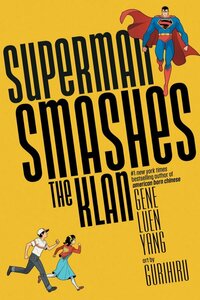Take a photo of a barcode or cover
It's not pandering, it's not preachy, it's just a good, old-fashioned, superhero story -- and at the same time, it's a heartfelt coming-of-age tale. The two pieces go incredibly well together, and a beautiful metaphor in the middle features the Golden Age Superman realizing that he can become the all-powerful Silver Age incarnation of the character if he stops trying to assimilate and embraces what makes him different. It's a genuine masterpiece.
The essays at the end of all three chapters also lend a lot of gravity to the story, allowing a reader to see where Yang is coming from when he blends all these elements together in a modern story. It sometimes gets a little too close to explaining his subtext/inspiration, but it works as a work of historical journalism, and gives a ton of useful background on the history of Superman, the history of racism in America, and his own autobiographical history.
Thank god for these artists who continue to stand for what they believe in. I fear how America would respond if this book was published today, only six years later. Lots has changed, leading to something as simple as the director of the new Superman movie pointing out an obvious fact about the character becoming a major political controversy that makes it even to Fox News. If only the big blue dude could go teach them a lesson too.
"Though our yesterdays may be different, we all share the same tomorrow."
First of all, Gene Luen Yang does a fantastic job of taking the 1940s Superman radio series as his source material and making it work for a modern audience, while retaining the story’s merit as a snapshot of what Chinese immigrants from the period experienced on a day-to-day basis. In the final pages of the book, Yang provides an essay on the historical background of both the show and the Klan history it draws from, along with his own personal experiences with growing up in the U.S. as an immigrant himself. If you do choose to read this book, I highly recommend you use those final pages as an introduction.
This is not simply a history lesson disguised as a Superman story, however. Yang manages to successfully weave two interdependent narratives together throughout the book: The Lee family, especially Roberta and Tommy, adjusting to life in Metropolis, and Superman adjusting to, well, basically not being lost in his head and embracing his “alien” traits. All the main characters feel fully fleshed out in the story as well, even the ones you just want to hate, and boy, are there some layers. You’ve got Roberta, trying to find where she fits in her new home. Inspector Henderson, facing the fight against the Klan as both a black man and a police officer. Chuck, growing up under the firm grip of his uncle, a high-profile Klan leader. And then of course, there’s Superman caught in between living a life of normalcy and using his full potential for good at the risk of losing the former.
The art is also fantastic, thanks to the creative team Gurihiru. The colors and inks are detailed throughout, really making it feel as if each character is jumping from the page. However, my favorite feature of the artwork is how Gurihiru design something that feels like a mixture of Western and Eastern comics. I see the familiarity of the popping coloring, the setting, even the text boxes. However, the two still integrate elements of their Japanese style in the character’s facial expressions and movements. Huh…that contrast is kind of like the Lee’s living in Metropolis….
Altogether, a brilliant book which I highly recommend. A Superman book for people who think they are too smart for or “don’t like” Superman ;)



